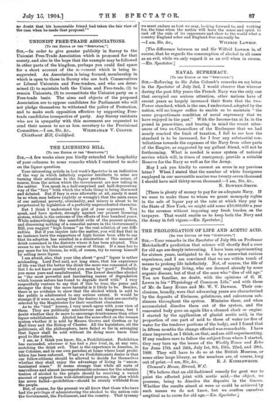THE LICENSING BILL.
[To TER EDITOR OF TEE "SYRCTATOR."]
SIR,—A few weeks since you kindly extended the hospitality of your columns to some remarks which I ventured to make on the liquor question.
Your interesting article in last week's Spectator is an indication of the way in which infinitely superior intellects to mine are turning their attention to the liquor problem. This arises, of course, from the action which the Government are now taking in the matter. You speak in a half-surprised and half-deprecatory way of the "fury" with which the whole thing is being discussed and debated. But if fury is ever allowable at all, surely it must be so when men believe (rightly or wrongly) that the main cause of our national poverty, criminality, and misery is about to be perpetuated by legislation of a perfectly unprecedented character.
But I think I understand the gist of your argument. You speak, and have spoken, strongly against our present licensing system, which is the outcome of the efforts of four hundred years. While acknowledging the manifold evils of the present system, and discerning nothing of a remedial nature in the Government's Bill, you suggest "high license" as the real solution of our diffi- culties. But if you inquire into the matter, you will find that in no instance have the supporters of high license been able to say that its adoption has resulted in a diminution of the amount of drink consumed in the districts where it has been adopted. This seems to me to be the natural course of things. If a man has to pay more for his license, he will, of course, try to recoup himself by selling more liquor.
I am afraid, also, that your idea about "good" liquor is rather misleading. Lord Peel said, not long since, that his experience of life was that the better the drink the more was consumed of it. But I do not know exactly what you mean by "good." Probably you mean pure and unadulterated. The Lancet describes alcohol as "the most powerful and fascinating means of degradation which human nature has found to degrade itself with.' I very respectfully venture to say that if this be true, the purer and stronger the drug the more harmful is it likely to be. Besides, there is no evidence to show that the alcohol which is sold to the public is adulterated to any serious extent. It would be strange if it were so, seeing that the dealers in drink are carefully selected by the Magistrates for their excellent characters.
As to the "tied' houses, I very much agree with your view of them. They are politically mischievous and dangerous, but I doubt whether they do more to encourage drunkenness than other liquor establishments. Alcohol has the same effect on the human system whether it is sold by Messrs. Groves and Gretton or by Earl Grey and the Bishop of Chester. All the legislators, all the politicians, all the philosophers, have failed so far in arranging that liquor shall be sold without its doing more harm than good to,the nation.
I am, as I think you know, Sir, a Prohibitionist. Prohibition has succeeded, wherever it has had a fair trial, in, at any rate, scotching the drink eviL That is the experience in America, in our Colonies, and in our own parishes at home where local prohi- bition has been enforced. What we Prohibitionists desire is that our fellow-citizens should be allowed to decide for themselves whether they shall enjoy the advantage of living in "uncon- taminated zones." It seems strange that while all sorts of marvellous and almost incomprehensibleschemes for the adminis- tration of alcohol to the people should be receiving a varied amount of support from well-intentioned persons, the plan which has never failed—prohibition—should be sternly withheld from the people. But, of course, for the present we all know that those who have had the privilege of administering the alcohol to the nation rule the Government, the Parliament, and the country. That tyranny
we must endure as best we may, looking forward to, and working for, the time when the nation will have the sense and spirit to cast off the rule of its oppressors and show to the world what a country England sober and England free can really be.
[The difference between us and Sir Wilfrid Lawson is, of course, that he regards the consumption of alcohol in all cases as an evil, while we only regard it as an evil when in excess. —En. Spectator.]


































 Previous page
Previous page